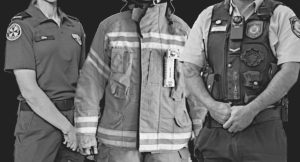First Responder Psychologists for Trauma, Anxiety & Burnout
We have a special interest and dedication in helping emergency service workers, like police officers, firefighters, paramedics, and ADF members manage the intense psychological demands of frontline service. Our first responder psychologists have firsthand experience working within law enforcement, paramedics, and defence, providing trauma-informed care grounded in real-world understanding.
Table of Contents
Cumulative Stress – When the Job Stays With You
Emergency service workers and first responders regularly encounter life-threatening situations, human suffering, and high-pressure environments. The constant exposure to trauma, unpredictability, and intense responsibility contributes to cumulative stress, which can manifest as persistent anxiety, depression, burnout, and PTSD.
Anxiety and hypervigilance are especially common, with symptoms such as persistent worry, intrusive thoughts, and an exaggerated startle response. Many first responders find themselves constantly scanning for danger, even in safe environments, leading to chronic tension and sleep disturbances. Over time, this heightened state of alertness can result in physical symptoms like headaches, digestive issues, and muscle tension.
Depression and emotional numbness often follow prolonged exposure to trauma. This can present as a loss of motivation, difficulty experiencing joy, withdrawal from loved ones, and an overwhelming sense of hopelessness. Some first responders describe feeling disconnected, as if they are “going through the motions” without truly engaging in life. Emotional blunting, a diminished ability to feel positive or negative emotions, is a key sign of trauma-related depression.
Burnout and exhaustion set in when prolonged stress depletes both physical and emotional reserves. Decision-making, reaction times, and problem-solving abilities decline, increasing the risk of mistakes in high-stakes situations. Burnout can also contribute to compassion fatigue, where first responders struggle to empathize with those they help, leading to cynicism and disengagement from work and personal relationships.
First responders in NSW face unique stressors; our emergency service workers have to face a range of challenges from urban emergency scenarios to large-scale natural disasters like bushfires and floods. The repeated exposure to human suffering, combined with organisational pressures and a lack of sufficient recovery time, places them at high risk for long-term mental health decline. Without support from first responder psychologists, these stressors can lead to chronic PTSD, career burnout, and a diminished quality of life. Early support and evidence-based treatments, such as Cognitive Behavioural Therapy (CBT) and Dialectical Behaviour Therapy (DBT), are crucial in helping first responders process trauma, develop coping strategies, and build resilience.
Why is it Hard to Access a Psychologist as an Emergency Services Worker
Over the years we have been working with first responders over the years, we have seen firsthand the struggles many face when it comes to mental health. The numbers speak for themselves: about one in three first responders experience stigma around mental health, and nearly one in ten face practical barriers to accessing care.
The stigma often stems from fears about confidentiality or worries that seeking help could harm their careers. On the practical side, things like not knowing where to go for help or struggling to find the time to schedule appointments can also stand in the way. These challenges are real, and they’re a big reason why so many first responders hesitate to reach out, even when they know they need support.
While less than 40% of the general population seeks care when experiencing distress, this number is likely even lower among emergency workers due to stigma, fears about confidentiality, and the deeply ingrained culture of self-reliance. At Personal Psychology, we offer priority, flexible, and completely confidential appointments to first responders. We are here for you!
What’s especially concerning is how stigma and barriers to care are tied to specific mental health concerns. For example, first responders dealing with PTSD, depression, or unhelpful habits are more likely to face stigma or struggle to get help. At the same time, those who’ve used mental health services in the past often report less stigma, which suggests that experience with care can help reduce fears. What’s worrying is that many first responders still try to handle mental health challenges on their own, often because of the intense pressures of their work. This “tough it out” mindset can delay help-seeking and lead to more severe issues down the line.
There are steps we can take to make things better. Organizations started normalising mental health care, making it part of routine check-ups, offering services in familiar settings like private clinics, and providing easy-to-use self-screening tools. Shifting the conversation to focus on mental health as a medical issue, rather than a personal failing, can also go a long way in reducing stigma. While progress takes time, these changes can make it easier for first responders to get the support they need, when they need it. Your mental health matters, and you don’t have to face these challenges alone.
Why PTSD, Anxiety & Burnout Develop in Frontline Roles
PTSD and related conditions are prevalent among first responders due to key occupational hazards.
Repeated exposure to trauma increases the risk of PTSD, as NSW emergency workers frequently witness incidents and crimes.
Many first responders also have limited downtime between shifts, leaving them without the opportunity to process traumatic events before facing the next crisis.
Additionally, a “tough-it-out” culture can prevent early intervention, as stigma around mental health often discourages help-seeking.
1 in 3 first responders experience PTSD (Black Dog Institute), and 1 in 5 NSW emergency service workers report high psychological distress (Beyond Blue). Burnout rates among paramedics are twice as high as in other professions (Australian Psychological Society).

Recognising PTSD, Anxiety & Burnout in First Responders
Physical
Chronic fatigue
Headaches, digestive issues
Sleep problems & nightmares
Elevated or irregular heart rate
Emotional
Guilt (“I should’ve done more”)
Anger outbursts
Emotional numbness
Persistent sadness
Behavioural
Withdrawing from colleagues & family
Reckless behaviour on & off duty
Increased risk-taking
Avoiding distressing situations
First responder Psychologists can Help with Long-Term Risks of Untreated PTSD, Anxiety & Burnout
When left unaddressed, PTSD, anxiety, and burnout can lead to career & job performance decline with increased sick leave, difficulty concentrating, and reduced effectiveness in high-stakes situations. Relationship breakdowns due to emotional withdrawal from partners, family, and friends. In severe cases, increased suicide risk, as first responders are at significantly higher risk of suicide than the general population (Phoenix Australia).
Early intervention saves not just careers, but lives. Reaching out for help is not a shame, but a step in the right direction.
Trauma-Focused PTSD, Anxiety & Burnout Treatment in North Sydney
Our first responder psychologists provide evidence-based therapies tailored to the unique needs of first responders. Our counselling in North Sydney offers:
Cognitive Behavioural Therapy (CBT): Helps reprocess traumatic memories and build coping mechanisms to manage stress and anxiety.
Dialectical Behaviour Therapy (DBT): Provides strategies for emotional regulation, distress tolerance, and mindfulness to enhance resilience.
Burnout Recovery Strategies: Includes mindfulness, structured debriefing techniques, and sleep optimisation strategies.
Holistic Support for Frontline Workers

We take a comprehensive approach to mental health, supporting both the individual and their broader network.
We provide individual therapy, with you to provide tools for stress management, emotional resilience, and mindfulness to help restore work-life balance.
We can also provide family therapy and couple’s therapy, providing counselling sessions to improve communication and rebuild trust with loved ones.
FAQs – PTSD, Anxiety & Burnout Support for NSW First Responders
What’s the difference between PTSD, burnout, and general stress?
- PTSD results from exposure to trauma and involves flashbacks, hypervigilance, and emotional numbness.
- Burnout is work-related emotional exhaustion, leading to detachment and reduced effectiveness.
- General stress can be short-term and situational but may lead to anxiety or depression if persistent.
How do I access Medicare rebates for therapy?
A GP, psychiatrist, or paediatrician can provide a Mental Health Care Plan (MHCP), allowing you to claim Medicare rebates for up to six initial sessions. After these, your GP can review your progress and approve four additional sessions per calendar year.
Is my therapy confidential?
Yes. All sessions are confidential under. Your employer will not be notified, and records are securely stored.
What if I need more than 10 Medicare-funded sessions?
If you require additional support beyond the 10-session Medicare limit, we can explore alternative funding options, including private health insurance rebates.
What’s the process for getting a GP referral for therapy?
Book an appointment with your GP and request a Mental Health Treatment Plan (MHTP). Your GP will assess your mental health needs and provide a referral to us.
Do I need to pay upfront and claim Medicare later?
At Personal Psychology, we process Medicare rebates for you on the spot, and the rebate will be sent to your account by Medicare in about a day.
Can I use private health insurance and Medicare at the same time?
No, you can’t claim both for the same session. However, if you run out of Medicare-covered sessions, you may use private health insurance for additional support.
Do I need a new referral every year for Medicare rebates?
Yes. Medicare covers a maximum of 10 sessions per calendar year, so you’ll need a new GP referral each year to continue accessing rebates.
Can I switch psychologists under the same referral?
Yes, you can. If your current psychologist isn’t the right for first responders, like yourself, your referral remains valid, and you can use it with us.
Can my partner or family be involved in therapy?
Yes. While Medicare rebates apply only to individual sessions, we offer family support and counselling to help rebuild relationships affected by trauma and stress.
What if I’m not sure I have PTSD?
You don’t need a formal diagnosis to seek help. If you’re experiencing anxiety, depression, sleep issues, or emotional distress, talking to a psychologist can help.
What if I’m stationed remotely?
We offer telehealth services across NSW, ensuring accessible mental health support regardless of location.
How often should I see a psychologist?
This depends on your individual needs. Most clients attend weekly, while others benefit from fortnightly sessions. We usually recommend starting weekly as most of our research-based interventions are studied in weekly setups.

